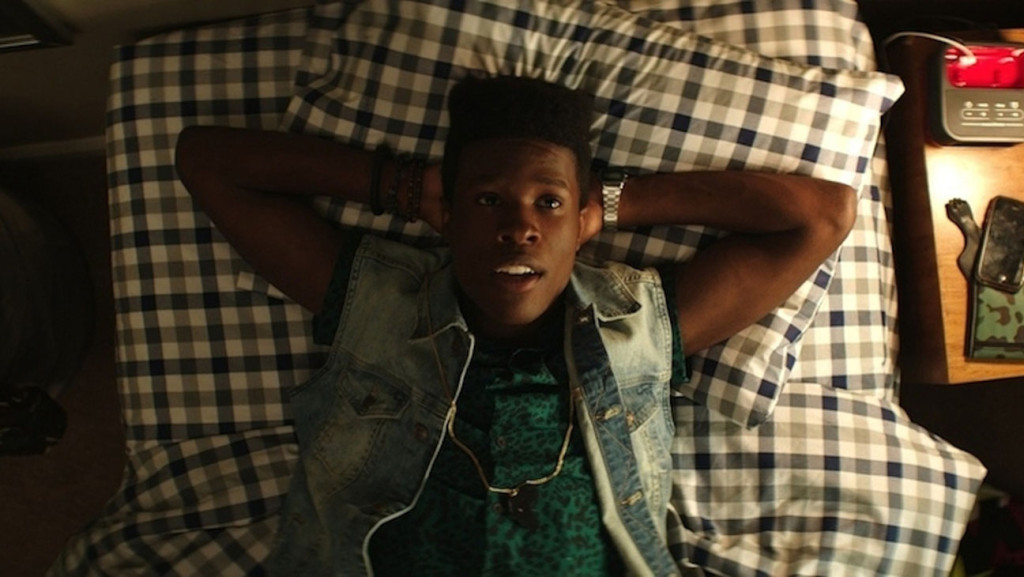Cannes: Dope review
 Dope’s lead character is Malcolm (Shameik Moore), a self-identified geek. He likes Game of Thrones, is in a punk band, and is obsessed with the nineties, and in particular nineties hip hop. 2 Live Crew, Digital Underground, Public Enemy and many, many more get a mention in Dope‘s dialogue, or an inclusion on the film’s extraordinary soundtrack.
Dope’s lead character is Malcolm (Shameik Moore), a self-identified geek. He likes Game of Thrones, is in a punk band, and is obsessed with the nineties, and in particular nineties hip hop. 2 Live Crew, Digital Underground, Public Enemy and many, many more get a mention in Dope‘s dialogue, or an inclusion on the film’s extraordinary soundtrack.
Malcolm has styled himself with a flat top, Nike Air Forces and some particularly garish nineties clothing. All of this contributes to him, and his two like-minded best friends, Diggy (Kiersey Clemons) and Jib (Tony Revolori), becoming social pariahs around their neighbourhood and at shcool.
Until, that is, their world tilts on its axis. Malcolm meets Dom (A$AP Rocky), a local drug dealer who sees something in the young man and, mostly by accident, embroils him in his criminal enterprise. Following a classic, movie-style bag mix-up in a club, the film begins hurtling forwards and barely pauses for breath as the three friends must race around town, and always with an urgent goal in mind, or somebody they’re attempting to evade.
Dope’s plotting is not exactly complex but it gets the job done and there are just enough twists to keep you guessing. And, most significantly, writer-director Rick Famuyiwa packs in so many rich details, cultural references and small surprises that the film can feel like repeat espresso shots, its intensity delivered right into the blood stream, supplying an unending supply of stimulation.
Famuyiwa does get a little carried away with trying to make Dope as lively as possible, and a number of his stylistic choices prove somewhat regrettable. Opening with a definition of the title or throwing in a little gratuitous split-screening smack of first-time director choices, but this is actually his fourth feature.
Whilst the liveliness does a great deal to keep the film interesting, it is the humour that carries Dope the furthest, and helps to keep the characters likeable even when the odd aesthetic choice might throw the audience off balance every now and then. Gags fly thick and fast, and some will be missed by plenty of people, though those who will understand references to 2 Chainz and Casey Veggies are likely to get a little more out of some of the scenes. And, thankfully, there’s also plenty of great comedic writing that doesn’t rely on a deep knowledge of the sort of popular culture that Dope is steeped in.
Famuyiwa doesn’t keep the film tied to his characters’ beloved nineteen-nineties, and a lot of the plot points are incredibly contemporary. Part of the story features an internet meme, for example, and it’s a relief that Famuyiwa doesn’t also try too hard on this front. References to YouTube, Gifs, the dark net and Instagram are the kind of things that can reek of desperation in the wrong hands but here, they simply seem to reflect the culture in which the film and its characters exist. Dope feels fresh and very much of the moment, but effortlessly and honestly so.
The film is also very much of the moment thematically too, and engage face-on with some modern concerns. Malcolm’s position in the world of Dope is clearly defined by his race, and by where he has grown up, and this allows the film to open up some effective social commentary. It’s not exactly heady on this front, but these levels of discussion certainly add to what is already an accomplished film.
As part of his Harvard application, Malcolm submits an essay called ‘A Research Thesis to Discover Ice Cube’s Good Day’ but is then encouraged to write something more “personal.” The pay-off here is a scene of Malcolm reading the new essay aloud, illustrated by relevant shots depicting his life. It’s not exactly subtle and it heavily recalls The Breakfast Club, but Famuyiwa knows this and primed the audience for it.
And just as Brian’s essay at the end of The Breakfast Club just about gets away with sweeping in to explicitly spell out the meaning of the film, so it goes with Malcolm and his own concluding thoughts.